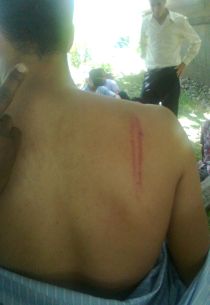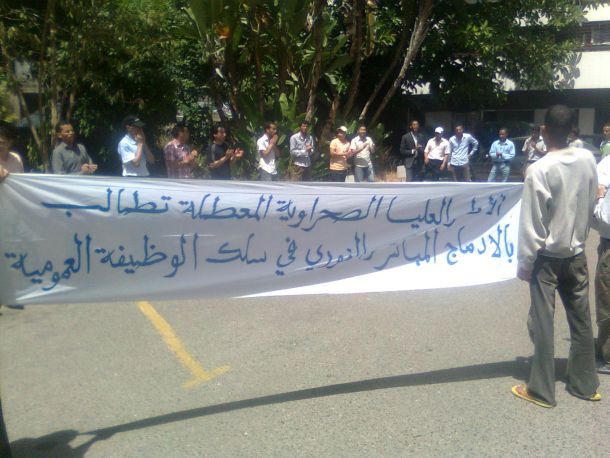Unemployed Saharawi graduates rally in Rabat

(Banner reads: “Our Sahara’s resources can provide us jobs” )
During the first two weeks of July, highly educated Saharawi took to the streets in Rabat, denouncing the Moroccan plunder of Western Sahara’s natural resources and the fact that they are discriminated in the job market simply for being Saharawi.
During the first two weeks of July, highly educated Saharawi took to the streets in Rabat, denouncing the Moroccan plunder of Western Sahara’s natural resources and the fact that they are discriminated in the job market simply for being Saharawi.
Published 22 July 2010
On 1, 6 and 15 July, about 300 unemployed Saharawi graduates demonstrated in front of the Ministry of Interior and the Prime Minister’s residency in Rabat.
All the protesters are young, highly-educated, but jobless. It’s certainly not a lack of qualifications that accounts for their unemployment. The hurdle seems to be the fact that they are Saharawi, not Moroccan.
According to a report by the Saharawi human rights organisation CODESA, 1.265 Moroccan diplômés chômeurs were recently offered jobs in the public sector. For months, this large group of university graduates stirred the political debate in Morocco by staging regular protests in front of Morocco’s parliament, demanding employment. Rumours are that the Moroccan government has employed the 1.265 Moroccan graduates in an attempt to cool things down. But despite promises by the Moroccan authorities to the contrary, no unemployed Saharawi were on the receiving end.
 Disgruntled protesters carried banners saying “highly educated Saharawi demand jobs now” and “our Sahara’s resources can provide us with jobs”. Particularly the latter banner triggered the Moroccan police to react strongly, eyewitnesses claim. The police tried to stop the manifestation by blocking the streets. An employee of the Royal Palace is said to have tried to run over protesters by car. Mehdi Zdaidat, one of the protesters, got wounded in the act and had to be taken to hospital (see picture on the right).
Disgruntled protesters carried banners saying “highly educated Saharawi demand jobs now” and “our Sahara’s resources can provide us with jobs”. Particularly the latter banner triggered the Moroccan police to react strongly, eyewitnesses claim. The police tried to stop the manifestation by blocking the streets. An employee of the Royal Palace is said to have tried to run over protesters by car. Mehdi Zdaidat, one of the protesters, got wounded in the act and had to be taken to hospital (see picture on the right).“Morocco gains so much money exploiting Western Sahara, and Saharawi can’t even get jobs. If highly educated Saharawi face that kind of discrimination, imagine what it’s like for other Saharawi who didn’t receive higher education”, said a participant who preferred to remain anonymous.
Of those who demonstrated 62 are said to have a DESA degree (Diplôme d'Études Supérieur Appliqué) and 218 hold Master degrees.
The students claim to have been in off and on discussions for over a year and a half with Abdesalam Elbakkari, the unemployment officer at the Prime Minister’s Kabinet. Mr. Elbakkari would have given the impression to be willing to tackle the students’ grievances. The students say they will resume the protests if their situation is not addressed soon.
Since the Moroccan invasion of Western Sahara in 1975, the Moroccan authorities have illegally exploited the territory’s abundant natural resources and poured the gains into furthering the untenable occupation. The job opportunities that resulted from the exploitation of the territory go to Moroccan settlers, lured into the territory with incentives of lower taxes, subsidies and housing programmes.
(Banner on picture below reads: “highly educated Saharawi demand jobs now”)

News
Dirty green energy on occupied land
How can it be wrong to develop renewable energy, in a world that is in desperate need for a green transition? In Western Sahara, the problems are numerous.
22 April 2024
EU Court adviser confirms separate and distinct status of Western Sahara
The Advocate General of the EU’s top Court backs the legal status of the people of Western Sahara. Final Judgment expected in a few months.
21 March 2024
EU Court adviser: fruit from Western Sahara should not be labelled as from Morocco
Labelling those products as originating in the Kingdom of Morocco instead of originating in Western Sahara breaches EU law, the Advocate General of the EU Court of Justice concludes.
21 March 2024
COWI abandons future projects in Western Sahara
After undertaking work for the Moroccan state phosphate company in Western Sahara, the Danish consultancy giant COWI states that it “will not engage in further projects" in the occupied territory.
11 March 2024



